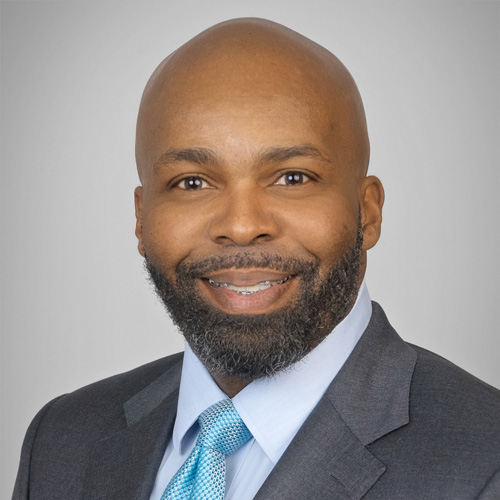Richard Greenhill, DHA: Illuminating the Path to AI-Driven Health Care Transformation

In today's rapidly evolving health care system, the integration of artificial intelligence (AI) holds immense promise for transforming the way we diagnose, treat and manage illnesses. Richard Greenhill, DHA, FACHE, CPHQ, is a visionary speaker and leader dedicated to advancing health care quality and AI technologies to revolutionize health care. He sat down with us to share what’s on the horizon for the future of health care.
While Greenhill has spent years developing his expertise in this area, he wears many other hats as well. He is the program director for the Bachelor of Science and Healthcare Management program at the TTUHSC, and is on faculty for both the undergraduate and graduate programs in Healthcare Management and Leadership at TTUHSC. He also leads the new Industry Advancement Technology (iAT) Accelerator at the Texas Tech University (TTU) Innovation Hub at Research Park.
AI and Health Care: The Benefits

Richard Greenhill, DHA, FACHE, CPHQ,
From helping with staff shortages to predicting patient outcomes and personalizing treatment plans, AI holds promises of unlocking new frontiers in health care innovation. “AI is showing promise in mitigating some of the difficult challenges that we face today around workforce shortages and burnout in health care,” Greenhill said. “AI algorithms have great potential as they are able to process large amounts of data from the Electronic Health Record (EHR) and other places, to aid providers with their clinical decision making.”
One of the key messages Greenhill discusses is the transformative impact AI can have on assisting clinicians with repetitive tasks to allow them more time with their patients.
“For health care delivery specifically, our workforce is experiencing burnout which in part may be due to process variation and waste associated with redundant administrative tasks. What if AI could augment charting and administrative tasks to allow physicians to spend 80% of their time with patients rather than the rushed 20 to 25% they spend now?” Greenhill said. “This would be a win for everyone and would boost patient safety and morale by giving physicians more time to actually treat patients, which is what most went into health care for in the first place.”
AI and Health Care: The Risks
With all the positive impacts for our health care system, AI does have a few risks and potential negative impacts to consider.
“Some of the risks are related to bias, around how data is used and interpreted. There is also statistical bias which arises from how models are chosen and the availability of data to feed those models. Large amounts of properly prepared data are needed to run AI models. Models used in clinical processes need to be as precise as possible to ensure patient safety. Thus, a strategy for data governance is key to map out effective data utilization including data integrity and quality etc. ” Greenhill said.
Greenhill's claims on data bias were highlighted in a non-health-care but relevant setting. Guardian News recently released an article discussing how AI software inappropriately assigned negative traits to certain races and positive traits to others because of historically flawed data. While this is not a health care example, it demonstrates how poor data quality can produce erroneous outputs. “AI follows the timeless old adage Garbage In Garbage Out” says Greenhill.
According to the article, “AI systems have produced biased responses in the past, with a tendency to reproduce the same problems that are found in their training data.” admitted Sundar Pichai, Google’s chief executive.
Keys to Success
Greenhill travels the country speaking on this topic communicating the significance of strategy for appropriate use of artificial intelligence to ensure patient safety and quality. “AI is not a magic bullet. The technology includes tools that produce results based on the data put into them. We must be diligent with our setup and background work to ensure we use this technology in the right way, to limit historical biases and not further marginalize vulnerable populations,” Greenhill said.
Greenhill will be presenting at the American College of Healthcare Executives (ACHE) 2024 National Congress this month and leading the panel on artificial intelligence and Chat GPT. The ACHE has over 48,000 members and is the preeminent health care management and leadership organization in the country. He recently joined the organization’s podcast and magazine, Healthcare Executive, to speak on this very topic.
Related Stories
TTUHSC Receives $1 Million Gift from Amarillo National Bank to Expand and Enhance Pediatric Care in the Panhandle
TTUHSC School of Medicine leaders accepted a $1 million philanthropic gift from Amarillo National Bank on Tuesday (Feb. 10), marking a transformational investment in pediatric care for the Texas Panhandle.
Texas Tech University Health Sciences Center Permian Basin Announces Pediatric Residency Program Gift
TTUHSC Permian Basin, along with the Permian Strategic Partnership and the Scharbauer Foundation, Feb. 5 announced a gift that will fund a new pediatric residency.
The Ph.D. Programs that Shape Health Care
The Graduate School of Biomedical Sciences Ph.D. programs at TTUHSC provide the foundation, mentorship and research opportunities you need to pursue groundbreaking work.
Recent Stories
National Academy of Inventors Names TTUHSC Faculty Senior Members
The National Academy of Inventors (NAI) has designated two current and one former TTUHSC faculty researchers as Senior Members.
The John Wayne Cancer Foundation Surgical Oncology Fellowship Program at Texas Tech University Health Sciences Center Announced
TTUHSC is collaborating with the John Wayne Cancer Foundation and has established the Big Cure Endowment, which supports the university’s efforts to reduce cancer incidence and increase survivability of people in rural and underserved areas.
TTUHSC Receives $1 Million Gift from Amarillo National Bank to Expand and Enhance Pediatric Care in the Panhandle
TTUHSC School of Medicine leaders accepted a $1 million philanthropic gift from Amarillo National Bank on Tuesday (Feb. 10), marking a transformational investment in pediatric care for the Texas Panhandle.
